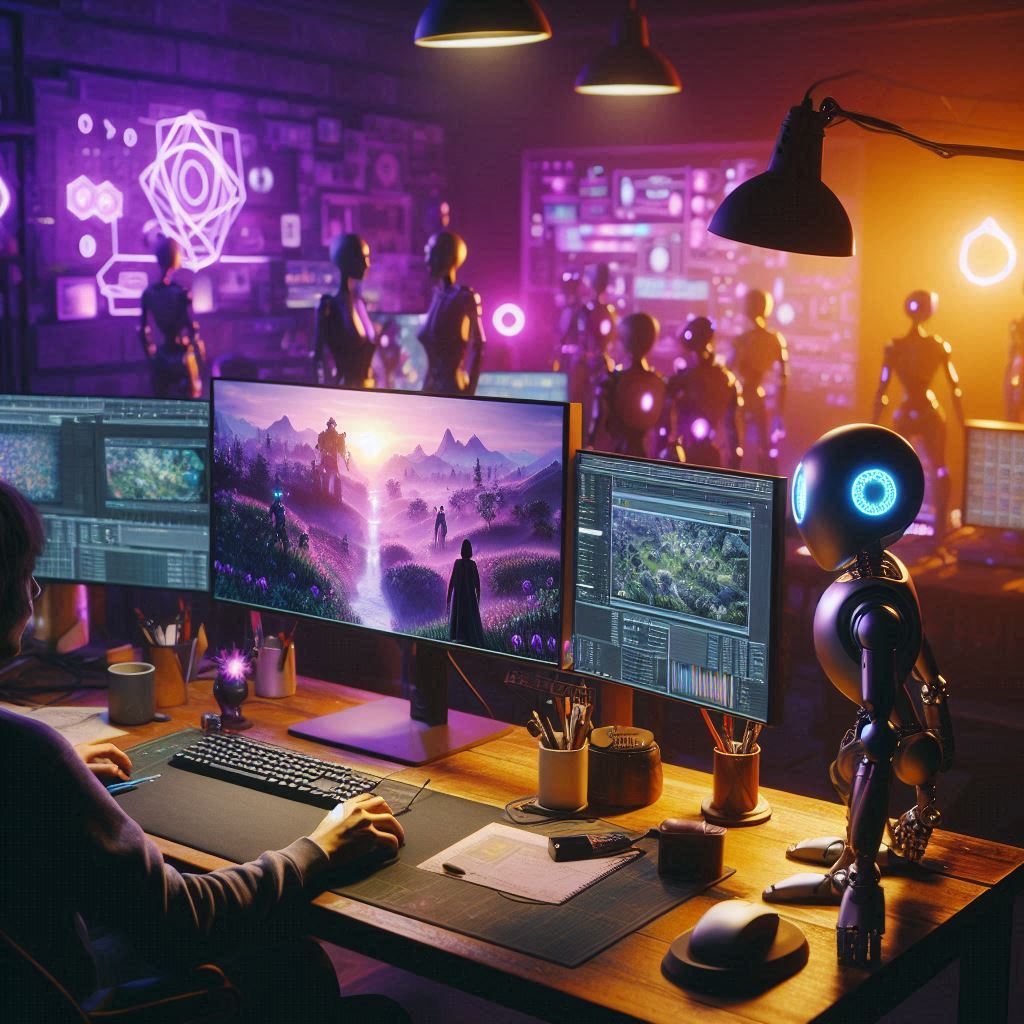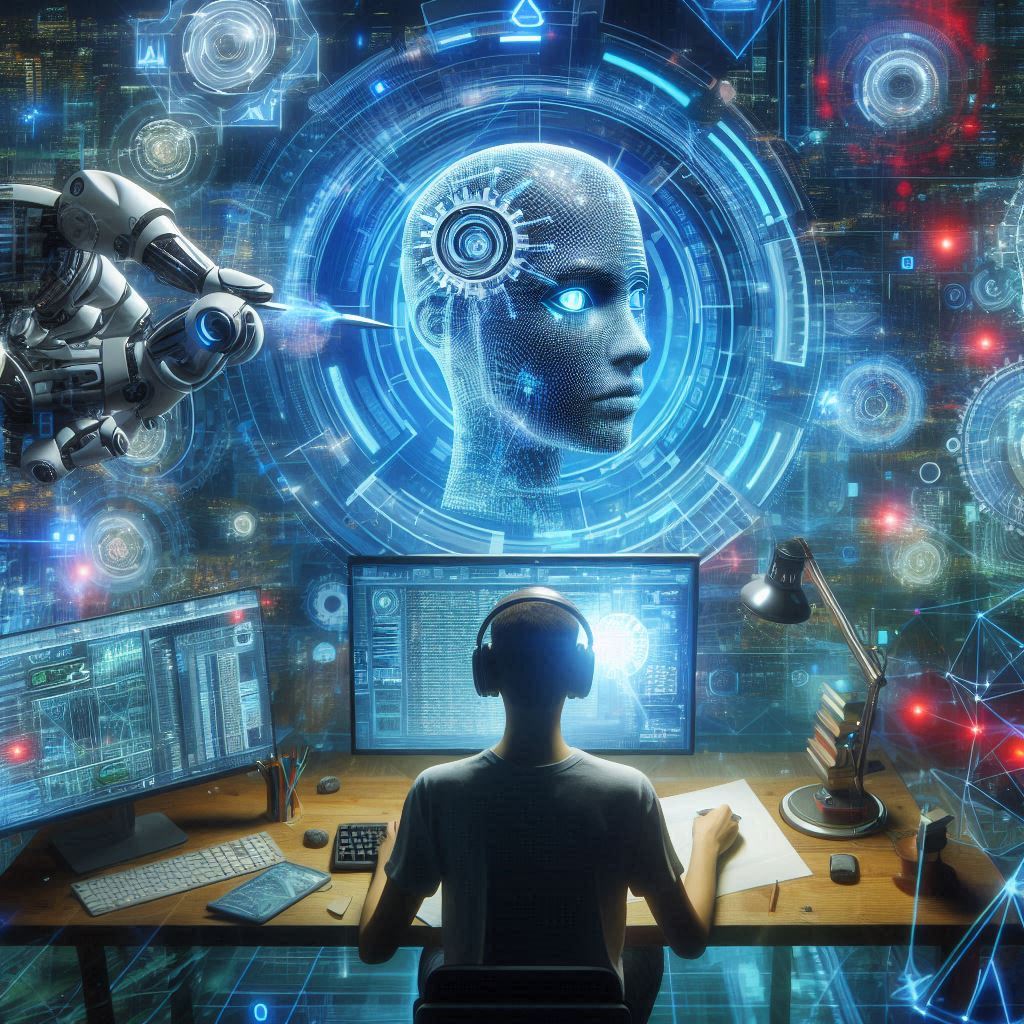You know that moment in Elden Ring when Malenia, Blade of Miquella, perfectly reads your input, dodges your attack, and proceeds to turn you into a Tarnished kebab for the 47th time? Well, what if I told you that’s just the tip of the iceberg when it comes to AI in gaming?
As someone who’s spent countless hours being humbled by FromSoftware’s masterpiece (and was occasionally close to throwing my controller across the room), I can’t help but wonder about the future that lies ahead.

Unless you’ve been living in the Roundtable Hold without an internet connection, you’ve probably noticed that AI has been making waves across every industry imaginable. Gaming is no exception, and as both a passionate gamer and tech enthusiast, I’m equal parts excited and terrified about what’s coming. Will future games adapt to our playstyles like a mind-reading Mimic Tear? Will NPCs become so realistic that we’ll need a Humanity check to tell them apart from real players?
Today, fellow Tarnished, we’re going to explore how AI is poised to revolutionize not just how we play games, but how they’re made. From the development trenches to the final boss fight, we’ll look at the ways artificial intelligence might transform our favorite hobby. And trust me, some of these possibilities are more mind-bending than trying to understand Elden Ring’s lore on your first playthrough.
So grab your Flask of Crimson Tears and settle in – we’re about to embark on a journey through the lands of future gaming, where silicon meets sorcery, and algorithms might just become our new gaming overlords.
The Current State of AI in Games: More “Artificial” Than “Intelligence”
Let’s be real for a moment – when most of us think about AI in current games, we’re basically talking about glorified if/then statements wrapped in fancy animations. Sure, Malenia might seem like she’s reading your mind, but she’s actually following a sophisticated but predetermined set of rules. It’s like a really complex dance routine where your inputs are the music, and the AI is that one friend who memorized all the steps but panics if you change the song.
Take your average NPC in most open-world games. They wake up, follow their daily routines, maybe say one of their five pre-recorded greetings when you pass by, and occasionally get stuck walking into walls. I’m looking at you, Skyrim guards – no amount of arrows to the knee explains your pathfinding issues. Even in more advanced games, most AI systems are basically elaborate decision trees with some randomization thrown in to keep things spicy.
But we’re starting to see some interesting innovations. Games like Middle-earth: Shadow of Mordor introduced the Nemesis System, where enemies remember your previous encounters and adapt their behavior accordingly. It’s still not true AI, but it’s a step toward more dynamic, responsive gaming experiences. More recently, games like The Last of Us Part II showed us AI companions that feel more like actual partners than walking health packs (looking at you, every escort mission from the 2000s).
Even our beloved Elden Ring, for all its brilliant design, still relies on fairly traditional AI systems. Those incredibly tough boss fights? They’re actually carefully choreographed dances of pattern recognition and trigger responses. Don’t get me wrong – they’re masterfully crafted and can absolutely wreck your day, but they’re not actually learning from your mistakes or adapting their strategies in real-time. When Margit delays his attack to catch your panic roll, that’s clever programming, not machine learning.
What’s really interesting is how some modern games are starting to incorporate elements of machine learning in subtle ways. Take racing games like Forza, which use AI to create “Drivatars” based on real players’ driving styles. Or consider how some modern fighting games use AI to analyze player behavior and adjust CPU opponent strategies. These aren’t revolutionary changes, but they’re early glimpses of what’s possible when we start incorporating more sophisticated AI systems into our games.
But here’s the kicker – most of what we call “AI” in current games isn’t really AI at all, at least not in the machine learning sense we’re all hearing about these days. It’s more like really sophisticated automation. The real revolution isn’t in what we’re playing right now – it’s in what’s coming next.
AI in Game Development: When Silicon Meets Sorcery
As someone who’s died enough times in Elden Ring to populate a small cemetery, I appreciate the painstaking work that goes into crafting these digital torture chambers we call games. But AI is about to flip the development script harder than a Patches questline.
First up: procedural generation on steroids. We’re not just talking about No Man’s Sky’s endless planets anymore. Modern AI can generate entire landscapes, complete with balanced resource distribution and strategic points of interest. Imagine exploring dungeons that aren’t just randomly assembled from pre-made pieces, but intelligently crafted to challenge your specific playstyle. The best part? These systems can create content faster than a speedrunner breaking Elden Ring’s sequence.
But it’s not just about creating pretty landscapes. AI is becoming the ultimate QA tester – one that never gets tired, never needs coffee breaks, and can simulate thousands of playthroughs in the time it takes us mere mortals to beat Malenia once. These systems can identify bugs, balance issues, and even predict player frustration points before the game hits beta. They’re like the Ever-Brilliant Goldmask of debugging – silently judging our code while standing perfectly still.
The real game-changer (pun intended) is in asset creation. AI tools are already helping developers generate textures, animations, and even basic character models. This means smaller studios can create AAA-quality assets without needing Miyazaki’s budget. Though let’s be honest – nothing will ever replace the twisted brilliance of hand-crafted FromSoftware boss designs. I mean, who else would think to give a woman prosthetic limbs, butterfly wings, AND scarlet rot?
AI-Enhanced Gameplay: Your Next Boss Fight Might Actually Be Learning
Remember how triumphant you felt finally beating a tough boss after learning their patterns? Well, future bosses might be learning your patterns too. AI-enhanced gameplay isn’t just about making enemies smarter – it’s about creating experiences that evolve with you.
Imagine NPCs with conversation abilities that rival ChatGPT, but with actual memory of your interactions. No more exhausting the same three dialogue options! Your choices and conversations could have genuine impact, creating truly personal storylines. That merchant you helped might actually remember you and offer unique deals, instead of just being another “Welcome, stranger!” bot.
Dynamic difficulty adjustment is getting smarter too. Instead of just tweaking enemy health bars or damage output, future games could analyze your playstyle and adapt accordingly. Struggle with parrying? The game might throw more dodgeable attacks your way while gradually introducing parry opportunities. Excel at ranged combat? Watch as enemies start using more cover and closing tactics.
The environments themselves could become responsive entities. Picture worlds that remember your actions and evolve accordingly, creating consequences that feel organic rather than scripted. Your epic battles could leave lasting scars on the landscape, and communities might actually change based on your decisions – not just flip between two pre-written states.
The Dark Souls of AI: Potential Challenges
But before we get too excited about our AI-powered gaming future, let’s address the Ulcerated Tree Spirit in the room. Technical limitations still exist – running sophisticated AI systems alongside modern graphics is like trying to fat-roll with full Moore’s armor. There’s also the question of balance: how do we keep games challenging and rewarding when the AI could theoretically become unbeatable?

The Future Beckons: A New Game Plus for Gaming
Let me put on my Helm of Prophecy here and peer into gaming’s future. While I can’t promise it’ll be more accurate than a Patches questline, the possibilities are as vast as Limgrave’s horizons.
In the near future, we’ll likely see AI becoming a game developer’s best companion – like a loyal Spirit Ash, but for creation rather than combat. Games will become more responsive, more personalized, and potentially more unpredictable. Imagine Souls-like games where every playthrough is truly unique because bosses actually learn and evolve, creating experiences that are impossible to simply YouTube your way through.
Looking further ahead, we might see games that can generate entire storylines on the fly, adapting to your choices in ways that make current “branching narratives” look like a straight path to the First Step. AI could create endless, meaningful content that stays fresh and challenging, no matter how many New Game Plus cycles you’ve been through.
But here’s the real question: Will this AI revolution make games better, or just different? As someone who’s grown to love the carefully crafted challenges of games like Elden Ring, I believe the sweet spot lies in using AI to enhance human creativity rather than replace it. After all, no algorithm could have dreamed up the beautiful madness of the Lands Between.
The Future is Loading…
So there you have it, fellow gamers – a glimpse into how AI might reshape our favorite pastime. Whether you’re excited about the possibilities or worried about losing the human touch in game design, one thing’s certain: change is coming faster than a Torrent gallop.
Will future games be better for it? Like any good Souls player knows, we’ll have to dive in and find out for ourselves. Just remember to level your adaptability stat – you’re going to need it.
What do you think about AI in gaming? Are you excited about more dynamic, responsive games, or do you prefer your challenges hand-crafted by human devs? Let me know in the comments below, if you like!
And remember: in a world of advancing AI, git gud might take on a whole new meaning.
Related Articles:
[1] https://appinventiv.com/blog/ai-in-gaming/
[2] https://kevurugames.com/blog/how-ai-is-disrupting-the-video-game-industry/
[3] https://elearningindustry.com/the-future-of-gaming-is-ai-how-artificial-intelligence-is-changing-everything
[4] https://www.bbc.com/news/business-68844761

Leave a Reply